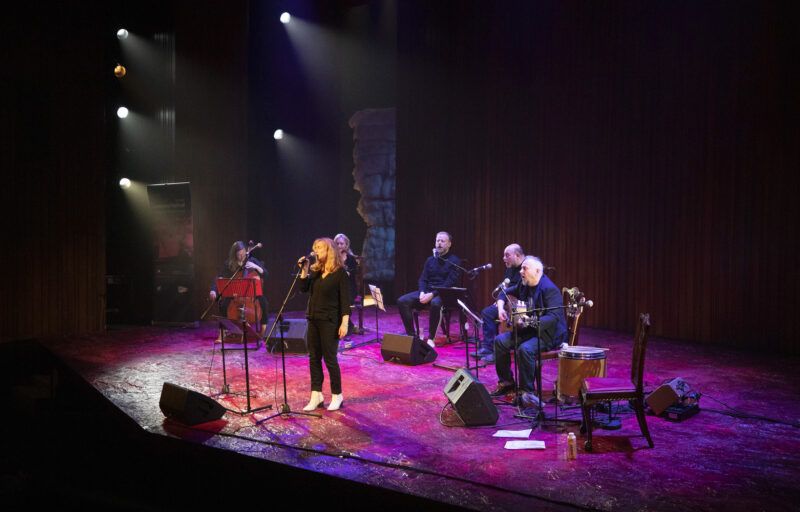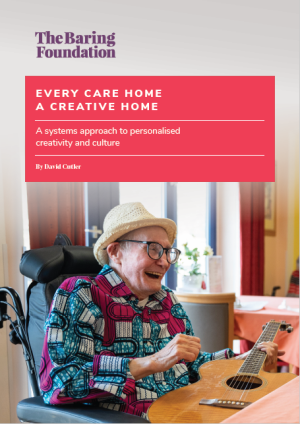This autumn Age & Opportunity (Arts) launched a National Arts & Creative Charter for Older People in Ireland. The launch of the initiative, which we believe is the first of its kind in the world, concludes a three-year process of discussion and consultation with and amongst older people (and the arts sector), in relation to their expectations and needs from the arts, as we/they age.
The main aim of the Charter, therefore, is to improve and extend the experiences of older people engaging with arts organisations in Ireland and to underline their value as active arts participants. We also want to support arts organisations so that they can deepen their relationship with older people. This enhanced engagement, we hope, will lead to increased confidence amongst older people when they visit and participate in the work of arts organisations.
Our involvement with a number of collaborative research projects … had revealed the need for older arts participants to feel more included and ‘welcome’ in their engagements with the arts…
The origin of the Charter lies in our search for a constructive method to engage with arts organisations around their relationships with older people. Our involvement with a number of collaborative research projects over recent years had revealed the need for older arts participants to feel more included and ‘welcome’ in their engagements with the arts. The research also underlined the desire of older communities to be understood by arts organisations as rich, complex and diverse arts participants and not as passive, homogenised consumers, audiences or even volunteers.
Further, the Charter was a response to a more long-term call for publicly funded arts organisations to actively consider physical access, audiences, participation and partnership development, as well as choice, in terms of their older arts communities, and critically, to communicate around this. (See the Creative Enquiry & Age & Opportunity/ Arts & Disability Ireland Access Audit). With this information in mind, we felt the need to create a document or statement of principles that organisations and the public could rally around. As a postscript to the aims of the Charter, we also saw (see) it as declarative in intent, vis-à-vis positive messaging and making visible older people’s involvement in the arts, a core part of our work and a mainstay of inclusion agendas.
The creation of the Charter was first discussed at a meeting in 2019 with a group of like-minded organisations whose work intersects with the arts and ageing. At the meeting, we teased out the potential and need for such a Charter and gained broad agreement about the possibilities it offered.
Arising from the meeting, a co-design group was created with these original organisational stakeholders, augmented by local authorities, artists and older people. Over the course of three years which coincided with the Covid-19 pandemic, and with the input of consultants and researchers, we developed a Charter outline vision.

During this process, the discussions were broad, warm and provided a welcome relief for many of us struggling with Covid-19, including those who had felt ghetto-ised by government restrictions based on age. Members of the group told stories of the presumptuous things people might have said to them, such as ‘are you still dancing… aren’t you great?’ and of older age often being seen through the lens of what you’re not. Others talked of the need to see age as a continuum and not ‘starting’ at any one point, underlining the importance of solidarity and sharing information across generations. The diversity and value of older age was a recurring theme, as well the potential within it. The resulting Charter vision was eventually tested with a period of public consultation leading to the final Arts & Creative Charter for Older People in 2022.
From the outset, our key stakeholders felt that the Charter should rest on values and principles which would represent our discussions and provide the overall Charter vision. These values and principles would also form the basis for any commitments we would seek from arts organisations, which had to be concrete, realisable and tangible. As such, arts organisations were being asked for accountability rather than simple goodwill. The final Charter, therefore, rests on eight pledges which concern welcome, accessibility, participation, dialogue, communication, diversity, policy and programming. Notwithstanding the deliberate measurability of most of the commitments, the subjectivity of certain concepts (like welcome) and the room for some interpretation is equally important to the partnership basis of, and developmental aim behind, the Charter.
In this respect, and as outlined above, we made the strategic decision that our role is to support arts organisations through offering training and information, a supportive network and a listening ear, rather than policing or monitoring. Quite apart from capacity issues, this decision is borne out of the strong view that a formal or compliance-based role would simply backfire and that a partnership approach would yield stronger results. We take the view that no matter where organisations might rank their starting point in terms of the commitments, we share a common goodwill towards the aims of the Charter and the structure to support each other to do better.
Our role is to support arts organisations through offering training and information, a supportive network and a listening ear, rather than policing or monitoring.
That said, we are currently testing out the parameters of the Charter and the level of support that organisations will need through a pilot initiative involving seven organisations. This pilot will be evaluated and inform a wider rolling out of the Charter nationally in 2023/2024. Initial responses are positive and indicate some higher expectations of arts organisations amongst older people.
However, there are other responses which have given us pause for thought. These include the role and impact of such sector or cohort-specific equality statements like the Charter when set against wider diversity and inclusion policies and whether they foreground one group (in this instance older people) above others. Certainly our current view is that much like Age & Opportunity, the Charter exists within the framework of positive action, and thus is unashamedly ‘for’ older people, though certainly not ‘against’ anyone else. Further, the Charter clearly addresses a distinct need in an imperfect world, and sits alongside or amplifies other inclusion documents, rather than replaces them. Notwithstanding this, as the initiative progresses and the world continues to change, our thinking will undoubtedly evolve.
For more information on the Charter see here: and here.
Dr Tara Byrne is Arts Programme Manager and Bealtaine Festival Artistic Director at Age & Opportunity
